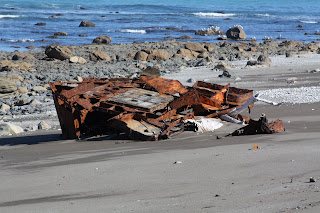 God of Carnage
God of CarnageCirca Theatre, 4 April – 2 May
Ferdinand (son of Annette and Alain Reille) has broken Bruno’s (son of Veronique and Michel Vallon) teeth with a stick. The middle-class, middle-aged parents gather to discuss the consequences like the polite and reasonable adults they are. Instead their civil conversation degenerates into adults behaving badly as they become as infantile as the children they are discussing. The question is asked, ‘Are we ever interested in anything but ourselves?’ and the answer is that I am certainly not interested in anything on this stage.
Veronique Vallon (Carmel McGlone) is a writer with expressive hand gestures who cares deeply about things, particularly at present the history of Darfur. Her husband, Michel (Andrew Foster) is a hardware salesman who appears to be acting in homage to John Cleese as Basil Fawlty. His impressions of a paralysed hamster liberated on the pavement and his mother hobbling along on crutches are hyperactive and amusing at least. Veronique has no sense of humour which is in itself quite funny despite the hints at alcoholism and deep depression.
 Their world is highly structured with neat piles of art books, starkly positioned furniture (if this is meant to be a natural front room the setting of the sofa alone negates it) and arrangements of tulips. Living against a backdrop of red corrugated iron walls, it is clear that this couple are minimalists who don’t like mess. It is equally predictable that chaos (represented in this case by drunkenness and vomit) is exactly what will be introduced. This is because the god of carnage has ruled since the dawn of time, apparently.
Their world is highly structured with neat piles of art books, starkly positioned furniture (if this is meant to be a natural front room the setting of the sofa alone negates it) and arrangements of tulips. Living against a backdrop of red corrugated iron walls, it is clear that this couple are minimalists who don’t like mess. It is equally predictable that chaos (represented in this case by drunkenness and vomit) is exactly what will be introduced. This is because the god of carnage has ruled since the dawn of time, apparently.Apart from people discussing their diets (thanks to my sister for pointing that out), the most boring topic of conversation on this earth is parents discussing their children. We are ‘treated’ to 90 minutes of debating different child-rearing techniques. Alain (Jeffrey Thomas) concedes that his son really is a savage, but despite the best efforts to interest children in reading and art, all boys really want to do is belong to gangs and pretend they are John Wayne or Spartacus.
Alain and Michel agree that perhaps the lads should just have it out ‘man to man’ until it is pointed out that they are only 11. Alain gets some of the best lines, such as ‘Children are the worst thing you can inflict on anyone’; ‘Children fracture and consume our lives’; ‘I’m not a pushchair father – it’s deathly all that’. Veronique questions, ‘Why have children in the first place?’ Why, indeed? There is no satisfactory answer to this question.
Alliances shift throughout the play between couples who fall in and out of agreement quicker than they down their rum. Initially the couples hold hands with an intimacy that will clearly be broken. When the Vallons bicker and Annette (Carol Smith) begins to argue with Alain, he cautions her, ‘Just because their marriage is fucked up, we don’t have to compete.’ Things reach such a state of suburban cliché, I am almost surprised that they don’t indulge in a spot of wife-swapping
In a rare moment of accord, the women agree that men are a dead weight when it comes to parenting and that they are instead wedded to their gadgets. Annette is irritated when Alain, a lawyer embroiled in a pharmaceutical debacle, takes increasingly frequent business calls. Having had a husband who is permanently on call and will answer his mobile in the middle of a conversation, I have to disagree with the reviewer who found this ‘compromised credibility’.
Evidently this is a play about words, which are emotive and have connotations. For example, was Ferdinand ‘armed’ or ‘furnished’ with a stick? The Reilles ‘don’t care for the word disfigured’ to describe Bruno’s toothless appearance. The courtroom parlance is introduced to the courtly parlour, as the couples find the art of co-existence goes deeper than the veneer of politeness.
It takes half an hour before they call each other by their first names; to ‘tutoyer’ someone is a big deal in France and this scene could echo the introduction of Gwendoline Fairfax to Cecily Cardew in The Importance of Being Earnest, except it lacks the comic and social commentary. It might be possible that the fault lies in the translation, but Chistopher Hampton (who wrote Les Liaisons Dangereuses) is not entirely to blame.
The acting is uniformly good, and each character gets their moment to shine with acerbic barbs and witty ripostes. All production values are more than adequately met, which indicates that the fact this falls flat is in the writing. Although I have never seen Art or any other works by Yasmin Reza, I had great expectations of this play based upon her reputation.
One of the characters says, ‘We are a lump of potter’s clay – it is up to us to shape something out of it’. The God of Carnage proves that sometimes idols really do have feet of clay.


.jpg)
.jpg)


.jpg)
.jpg)
.jpg)
.jpg)
.jpg)
.jpg)
.jpg)
.jpg)
.jpg)